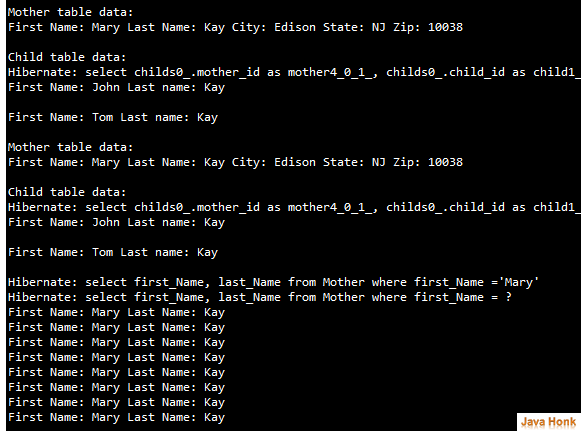Hibernate Native SQL Queries
Hibernate also provide functionality to execute directly native SQL query to fetch data from database. Below is examples:
Note: This demo is extension of previous tutorial. If you are interested to see full working example with all set up please refer this tutorial Hibernate One To Many Annotation Example
- Pure native SQL statement where hibernate maps all return value to java bean and return you specified object:
Query query = session.createSQLQuery("select * from Mother " + "where first_Name = :first_Name") .addEntity(Mother.class); query.setString("first_Name", "Mary"); List<Mother> moList = query.list();
- OR you could also use this:
query = session.createSQLQuery("select * from Mother " + "where first_Name = 'Mary'") .addEntity(Mother.class); moList = query.list();
- Native SQL statement where hibernate maps return value as an object array:
query = session.createSQLQuery("select first_Name, last_Name " + "from Mother where first_Name ='Mary'"); List<Object[]> list = query.list();
- OR you could also use this:
query = session.createSQLQuery("select first_Name, last_Name " + "from Mother where first_Name = :first_Name"); query.setString("first_Name", "Mary"); list = query.list();
- Complete java class:
package com.javahonk; import java.util.Iterator; import java.util.List; import java.util.Set; import org.hibernate.Query; import org.hibernate.Session; import org.hibernate.SessionFactory; import com.javahonk.bean.Child; import com.javahonk.bean.Mother; import com.javahonk.util.HibernateUtil; public class NativeSQLQuery { static SessionFactory sf = HibernateUtil.getSessionFactory(); public static void main(String[] args) { Session session = sf.openSession(); //******************************************************** Query query = session.createSQLQuery("select * from Mother " + "where first_Name = :first_Name") .addEntity(Mother.class); query.setString("first_Name", "Mary"); List<Mother> moList = query.list(); //OR you could also use this query = session.createSQLQuery("select * from Mother " + "where first_Name = 'Mary'") .addEntity(Mother.class); moList = query.list(); for (Mother mother2 : moList) { System.out.println("Mother table data:"); System.out.println("First Name: "+mother2.getFirstName() +" Last Name: "+mother2.getLastName()+" City: " +mother2.getCity()+" State: "+mother2.getState() +" Zip: "+mother2.getZip()+"\n"); System.out.println("Child table data:"); Set<Child> childs=mother2.getChilds(); for (Iterator<Child> iterator = childs.iterator(); iterator.hasNext();) { Child child3 = (Child) iterator.next(); System.out.println("First Name: " +child3.getFirstName()+" Last name: " +child3.getLastName()+"\n"); } } //******************************************************** query = session.createSQLQuery("select first_Name, last_Name " + "from Mother where first_Name ='Mary'"); List<Object[]> list = query.list(); //OR you could also use this query = session.createSQLQuery("select first_Name, last_Name " + "from Mother where first_Name = :first_Name"); query.setString("first_Name", "Mary"); list = query.list(); for (Object object : list) { Object[] li = (Object[])object; System.out.println("First Name: "+li[0]+" Last Name: " +li[1]); } session.close(); } }
Output:
For more information about HQL please read this hibernate official tutorial

